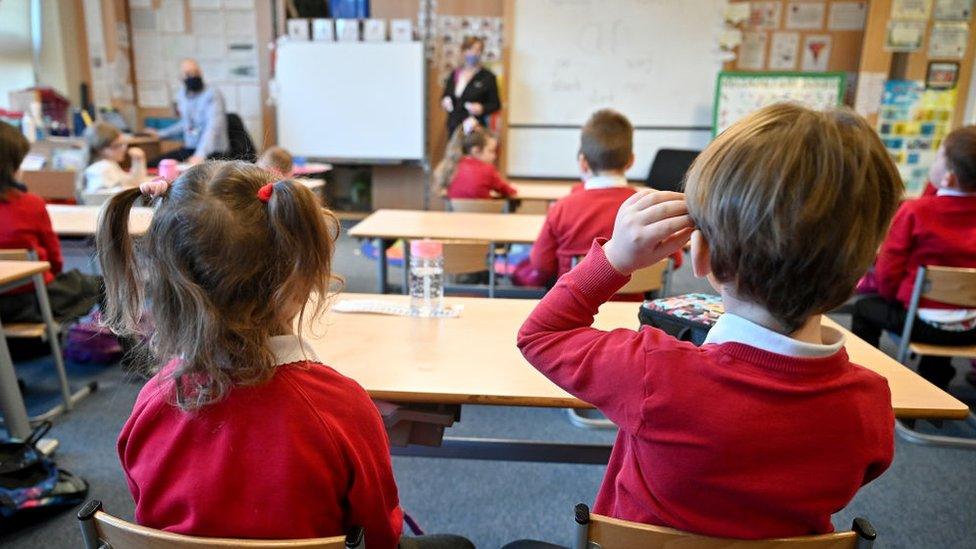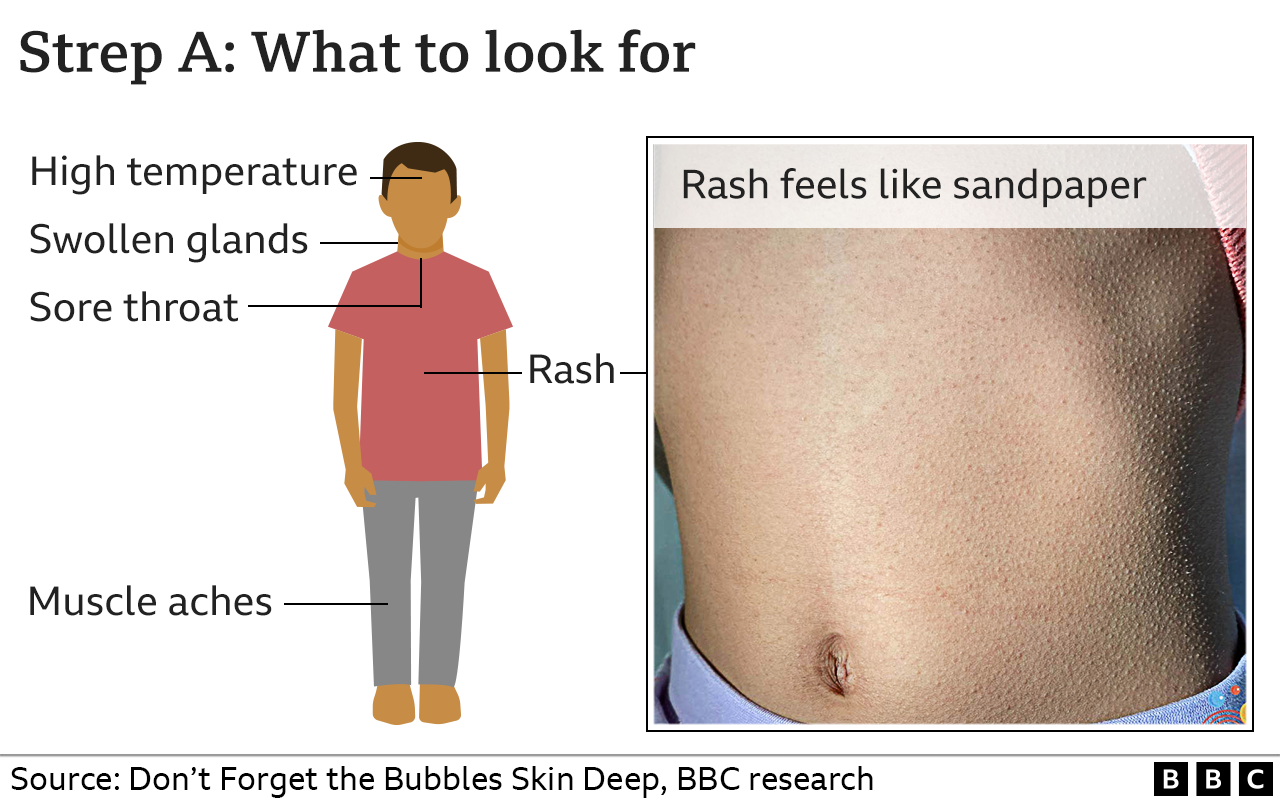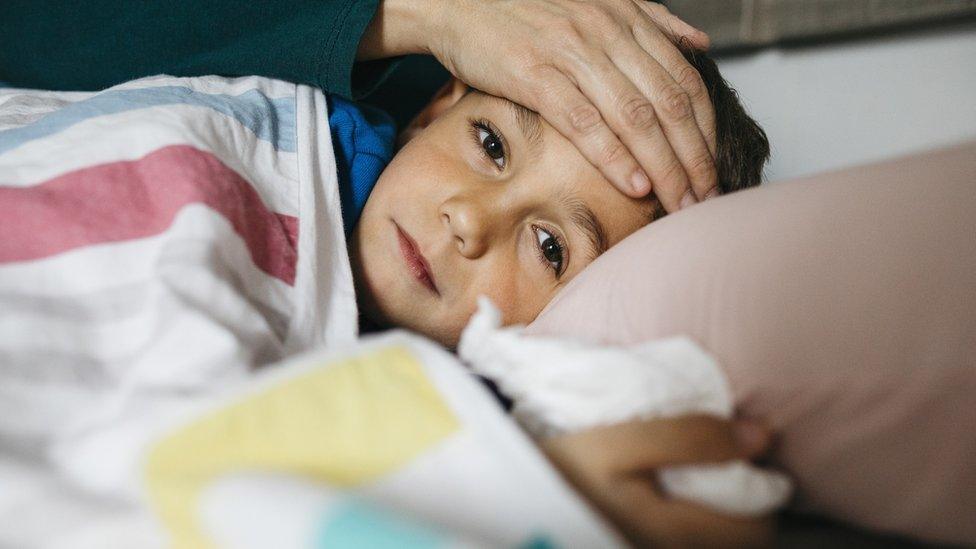Strep A schools in Scotland could get antibiotics
- Published

The health secretary said he would issue guidance on preventative antibiotics in schools following a rise in strep A cases
Pupils at schools with cases of streptococcus A could get preventative antibiotics following nine deaths linked to the bacteria across the UK.
Health Secretary Humza Yousaf said he would be issuing advice on the matter, adding the whole health service was "on alert" for cases.
There have been no deaths from severe strep disease in Scotland.
However, Mr Yousaf said he expected cases to increase over the coming weeks.
It comes after the issue of preventative antibiotics was raised in the House of Lords on Monday.
Parents are being urged to be vigilant for symptoms and to promptly contact their GP or NHS24 if they have any concerns.
It is not known how many cases of strep have been identified in Scotland, but the health secretary said they have not exceeded previous peak levels.
On Tuesday Mr Yousaf was asked by Scottish Conservative MSP Sandesh Gulhane whether the Scottish government was considering preventative antibiotics for schools.
In response, Mr Yousaf said: "I've asked Public Health Scotland (PHS) and my clinical colleagues to give advice to that effect.
"What I would say is the levels of GAS infection we're seeing, those cases are mild.
"But we're not complacent, we do expect cases to rise over the coming weeks hence why I've asked clinicians to give advice on the very issue Sandesh Gulhane has raised."
The Scottish government later issued a statement saying routine proactive use of antibiotics is "not currently recommended", but it may be considered by clinicians on a case-by-case basis.
Prof Jim McManus, who is president of the Association of Directors of Public Health, told the BBC's Good Morning Scotland programme there had been "too much hype" over the English guidance.
He said: "There are cases under the English guidance where antibiotics will be given if there are children in the school connected in an epidemiological way like siblings or they may have the same infection to a child that has been hospitalised.
"What I don't think you'll see is an entire year group being given them because the benefit would be minimal, antibiotic resistance would be significant and actually the antibiotic supply itself doesn't allow us to give penicillin to an entire school."
What is strep A?
Strep A is a bacteria sometimes found in the throat or on the skin.
Many people carry it harmlessly without even knowing, but they can spread it to others who might become ill.
People can catch it through close contact and from coughs and sneezes, meaning outbreaks can sometimes happen in places like schools and care homes.

Most often, symptoms are mild - a sore throat or a skin infection that can be easily treated with antibiotics.
But strep A can cause a range of things - and some of them are more serious.
One is scarlet fever, which mostly affects young children and, again, needs antibiotics.
Very rarely, strep A can cause invasive group-A streptococcal infection (iGAS), which can be deadly.
'No shortage of penicillin'
Public Health Scotland guidance, external states that strep A peaks usually occur every three to four years, and the last time there were a significant number of cases was during the winter of 2017-18.
It also suggests social distancing measures during the Covid-19 pandemic could have interrupted this cycle.
For scarlet fever, for example, in the week of the 14 to 20 November this year there were 851 cases reported - a rise compared to the average of 186 cases seen in recent years.

Mr Yousaf was asked an urgent question on the government's response to strep A
Mr Yousaf added that PHS has issued an alert to all health care services, including GPs, to be aware of strep A and to take a "low threshold" to prescribing antibiotics.
He mentioned recent reports which suggested the UK faces a shortage of the antibiotic amoxicillin, a type of penicillin which is used to treat strep A.
However, the health secretary said he had checked with clinicians and the chief pharmaceutical officer, and heard there was no shortage in Scotland.

What should parents do?
Trust your judgement if your child seems seriously unwell.
Contact your local GP surgery if they:
are deteriorating
are eating much less than normal
show signs of dehydration, such as a dry nappy for 12 hours
have a temperature of 39C or higher, or 38C if under three months
are a baby and feel hotter than usual when you touch their back or chest, or are sweaty
are very tired or irritable
Call 999 or go to an accident-and emergency unit if:
they are having difficulty breathing - you may notice grunting noises or their stomach sucking under their ribs
they are pausing when they breathe
their skin, tongue or lips are blue
they are floppy and will not wake up or stay awake
Related topics
- Published6 December 2022

- Published5 December 2022

- Published9 December 2022
